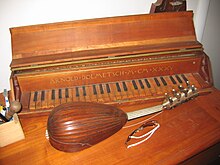Arnold interpreting
Eugène Arnold Dolmetsch (born February 24, 1858 in Le Mans , † February 28, 1940 in Haslemere , Surrey ) was a French musician and instrument maker who worked in England from 1917. He is considered to be one of the earliest pioneers of historical performance practice and, in this context, is associated with the rediscovery of the recorder in the 20th century.
Life
The son of the Swiss piano maker Rudolph Arnold Dolmetsch (1827–1874) first studied violin with Henri Vieuxtemps at the Royal Conservatory in Brussels . He then continued his studies at the Royal College of Music in London with the violinist Henry Holmes and the composer and conductor John Frederick Bridge and obtained a Bachelor of Music degree in 1889.
While studying in London, Dolmetsch admired the collection of historical musical instruments in the British Museum and began to build harpsichords and clavichords . He later expanded the activity of historical instrument making to include most of the forgotten musical instruments of the 15th to 18th centuries. His professional workplaces were Boston and Paris before he opened his workshop in Haslemere in 1917 for fear of the bombing of Paris. From 1890 he often gave concerts on his instruments. In 1919 he presented a replica of an alto recorder based on a historical model.
In 1925, Dolmetsch founded an annual festival to revive old chamber music in his place of residence. Some of the performers were friends and members of his family. In this way he aroused interest in solo and ensemble music on lutes, recorders, viols and harpsichords.
The family ensemble
- Mabel Johnston Dolmetsch, his wife, played the violone and led the dance groups
- Rudolph Dolmetsch, his son, played the harpsichord and clavichord (died in the Second World War in 1942 when the ocean liner Ceramic was sunk )
- Nathalie Dolmetsch, his daughter, played viol and was the director of the "Viola da Gamba Society"
- Carl Frederick Dolmetsch, his son, played the recorder and took over the instrument making workshop, mainly with the production of the recorders
- Cecile Dolmetsch, his youngest daughter, played viol
The interpreting group continued its work even after his death. Here particularly stepped Kenneth Skeaping on the baroque violin out.
The festival
The International Dolmetsch Early Music Festival , which takes place every July, is directed by Dolmetsch's granddaughter Jeanne Dolmetsch. She learned the recorder, treble viol and harpsichord from her father and studied violin and piano at the Royal Academy of Music in London.
The instrument workshop
Dolmetsch's descendants continue to run the company founded by Arnold Dolmetsch to this day and in particular make copies of historical keyboard instruments and recorders. The violin maker Günther Hellwig worked in Haslemere from 1928 to 1932.
Works
- Arnold Dolmetsch: The Interpretation of the Music of the XVIIth and XVIIIth Century. Novello, London 1915. Reprint: University of Washington Press, Seattle et al. 1980, ISBN 0-295-78578-0 .
literature
- Margaret Campbell: Interpreter. The man and his work. Hamilton, London 1975.
Web links
- Interpreting instrument making (English)
- Sheet music and audio files by Arnold Dolmetsch in the International Music Score Library Project
- Klaus Meyer: Arnold interpreting. (mp3 audio, 4.3 MB, 4:25 minutes) In: BR-Klassik broadcast “Keyword - Lexicon of Early Music”. 2nd June 2019 .
Individual evidence
- ^ Brian Blood: The Dolmetsch Story. In: dolmetsch.com. September 18, 2018, accessed June 2, 2019 .
| personal data | |
|---|---|
| SURNAME | Dolmetsch, Arnold |
| BRIEF DESCRIPTION | French violinist and instrument maker |
| DATE OF BIRTH | February 24, 1858 |
| PLACE OF BIRTH | Le Mans |
| DATE OF DEATH | February 28, 1940 |
| Place of death | Haslemere , Surrey |
